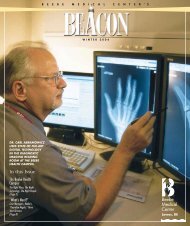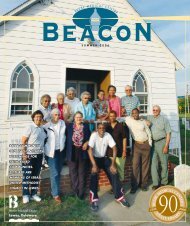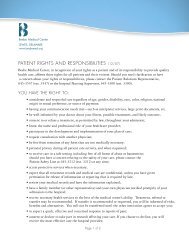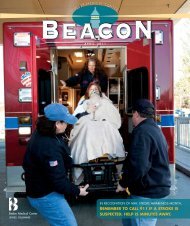BEACON â Winter 2005 - Beebe Medical Center
BEACON â Winter 2005 - Beebe Medical Center
BEACON â Winter 2005 - Beebe Medical Center
Create successful ePaper yourself
Turn your PDF publications into a flip-book with our unique Google optimized e-Paper software.
Delawareans:<br />
GET CHECKED FOR<br />
COLORECTAL CANCER<br />
Raising Awareness,<br />
Raising the Cure Rate<br />
Delaware Health and Social Services, Division of<br />
Public Health, with cooperation from the Delaware<br />
Cancer Consortium and Screening for Life, launched<br />
a grassroots effort this year to encourage Delawareans<br />
50 and older to get tested for colon cancer.<br />
The program includes an initiative called Champions<br />
of Change, an effort to raise colon cancer awareness<br />
among African Americans, who are a particularly<br />
high-risk group.<br />
A critical part of this effort is establishing Colorectal<br />
Cancer Screening Advocates/Care Coordinators at<br />
hospital sites throughout the state. Catherine Ward,<br />
R.N., is the colorectal cancer screening advocate/<br />
care coordinator (SACC) at <strong>Beebe</strong> <strong>Medical</strong> <strong>Center</strong>.<br />
As a patient advocate, she is responsible for finding<br />
and linking patients in the community to available<br />
cancer screenings and, when necessary, other available<br />
resources to supplement cancer care for patients.<br />
Ms. Ward has worked at <strong>Beebe</strong> <strong>Medical</strong> <strong>Center</strong><br />
for 11 years and enjoys her new role: “Being the<br />
designated screening advocate and care coordinator<br />
for colorectal cancer gives me the opportunity to<br />
encourage our community members to take control<br />
over a life-threatening situation that has a tremendous<br />
cure rate.”<br />
Delawareans over 50 should ask their doctors<br />
about getting screened,<br />
or call Screening for Life<br />
at 1-800-464-HELP to<br />
find out if they qualify<br />
for a free screening.<br />
“The most exciting part of treatment<br />
is the improvement in the survival of<br />
patients—even with advanced colon<br />
cancer. I continue to be encouraged.”<br />
—Dr. Pramod Vadlamani, medical oncologist at<br />
<strong>Beebe</strong> <strong>Medical</strong> <strong>Center</strong>’s Tunnell Cancer <strong>Center</strong><br />
radiation, but Cathie and I<br />
left there feeling positive,”<br />
Mr. Nagy remembers. “The<br />
staff at the Tunnell Cancer<br />
<strong>Center</strong> walked me through<br />
each step.”<br />
“Colon cancer is<br />
classified in four stages.<br />
We treat stages I, II, and III<br />
with chemotherapy after<br />
surgery. Stage IV is cancer<br />
that has spread to the liver<br />
or lungs,” Dr.Vadlamani explains.“Treatment has taken tremendous leaps in recent<br />
years and has almost doubled survival rates for the majority of patients.”<br />
The Tunnell Cancer <strong>Center</strong> utilizes all drugs approved for treating colon cancer<br />
and can provide state-of-the-art treatment for the majority of patients. “The most<br />
exciting part of treatment is the improvement in the survival of patients—even with<br />
advanced colon cancer. I continue to be encouraged,” explains Dr.Vadlamani.<br />
Mr. Nagy responded very well to treatment, which consisted of chemotherapy<br />
on Fridays, followed by a new pump of infusional 5 Fluorouracil, which has become<br />
the standard of care and delivers chemotherapy through a portable pump throughout<br />
the weekend. Mr. Nagy modified his routine only slightly—drawing plans for his<br />
construction projects on days during his chemo and boosting his immune system<br />
on his own regimen of healthy foods and vitamins.<br />
“The nurses would call me every Monday morning after my treatment weekends<br />
and usually get my answering machine. I like to stay busy,” Mr. Nagy smiles. His positive<br />
attitude and trademark sense of humor were key<br />
factors in his successful treatment regimen, as well.“It<br />
is amazing how many people you talk to that have 5-, 10-,<br />
even 20-year success stories for their recovery. It makes<br />
it easier knowing that it’s just a blip in the radar of life—<br />
a big blip—but still just a blip.” ■<br />
Community Health coordinator<br />
Kay Malone (left) and colorectal<br />
advanced care coordinator<br />
Cathy Ward review colon cancer<br />
screening educational materials.<br />
10








